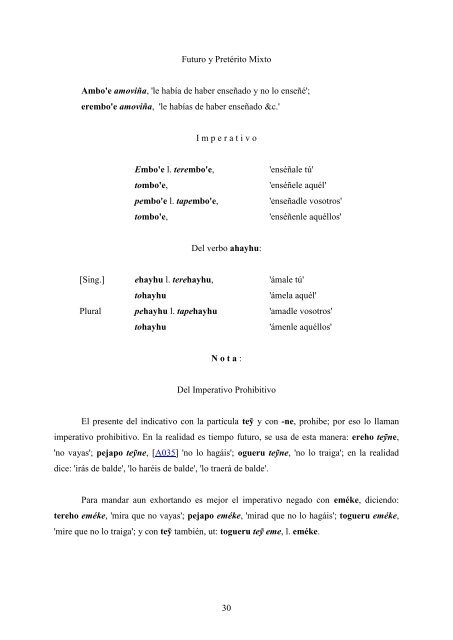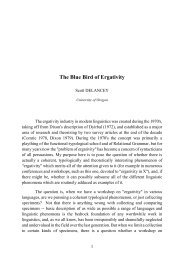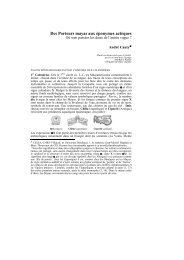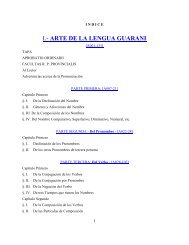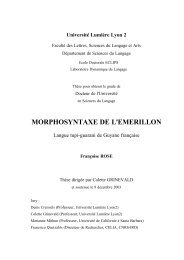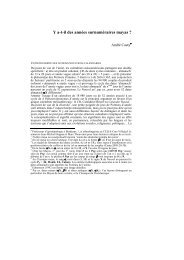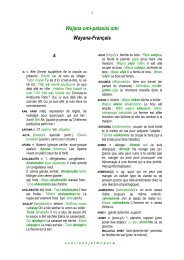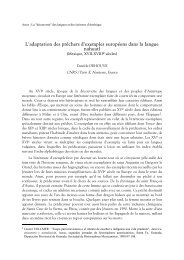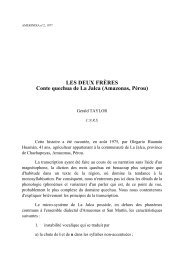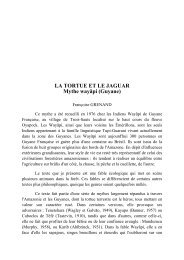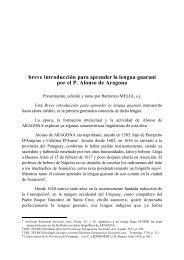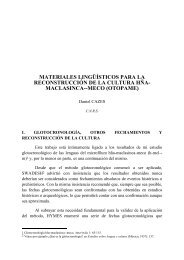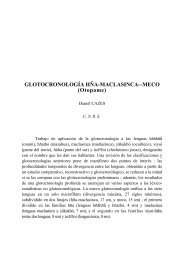- Page 1 and 2: ARTE DE LA LENGUA GUARANI POR EL P.
- Page 3 and 4: FACVLTAS R. P. PROVINCIALIS Ludovic
- Page 5 and 6: Advertencias acerca de la Pronuncia
- Page 7 and 8: No tiene esta lengua F, ni L, ni Jo
- Page 9 and 10: la partícula heta que sig[A007]nif
- Page 11 and 12: Con narigales hace me, ut: tata añ
- Page 13 and 14: §. II Géneros y Afecciones del No
- Page 15 and 16: ‘huérfano’ ; tyryry, ‘arrast
- Page 17 and 18: Del Diminutivo El diminutivo se hac
- Page 19 and 20: P A R T E S E G U N D A D e l P r o
- Page 21 and 22: En el Dativo Plural hace peẽme, m
- Page 23 and 24: Ha'e, l. ha'eva'e, 'él', 'ellos',
- Page 25 and 26: Activos son los que tienen caso pac
- Page 27 and 28: conjugación pondré luego; se dist
- Page 29: Pero en los futuros, imperativos y
- Page 33 and 34: del verbo aheka, 'le busco': [Sing.
- Page 35 and 36: Pretérito Pluscuamperfecto Ahayhut
- Page 37 and 38: De los antecedentes o consiguiente
- Page 39 and 40: [Sing.] Cheresarái 'yo me olvido'
- Page 41 and 42: Item al futuro y pretérito mixto,
- Page 43 and 44: Dos negaciones afirman, ut: nambo'e
- Page 45 and 46: Capítulo Segundo §. I De la Compo
- Page 47 and 48: Finalmente noto que pueden admitir
- Page 49 and 50: muchos lo que importa el verbo, pue
- Page 51 and 52: pisaron ad invicem'; okyhyje ojochu
- Page 53 and 54: hace activo, ut: añangareko, 'cuid
- Page 55 and 56: otra cosa'. Hace no con las diccion
- Page 57 and 58: La persona a quien hace hacer la ac
- Page 59 and 60: E al fin del verbo significa »apar
- Page 61 and 62: Dice también »todo, sin dejar cos
- Page 63 and 64: Primero se han de quitar las partí
- Page 65 and 66: ndipora'úi jetei mba'eũ amo hese
- Page 67 and 68: Chuã rembijukakue, 'Pedro fue a qu
- Page 69 and 70: Su negación es la común, ut: ndor
- Page 71 and 72: cuáles letras se quitan, añaden o
- Page 73 and 74: Algunos piden Dativo, ut: avahẽ c
- Page 75 and 76: principal y más general, y se pued
- Page 77 and 78: Los romances pues »enseñando« y
- Page 79 and 80: yvápene. El romance »por« se hac
- Page 81 and 82:
los demás derivados del verbo aiko
- Page 83 and 84:
Tiene los tiempos que son comunes a
- Page 85 and 86:
nombres. Tiene los cuatro tiempos d
- Page 87 and 88:
est la ropa, a la cual mira princip
- Page 89 and 90:
Con esta partícula háva pospuesta
- Page 91 and 92:
[A118] Dios esas cosas que se cría
- Page 93 and 94:
Por este verbal se suplen todos los
- Page 95 and 96:
Anotaciones para la Praxis Pueden l
- Page 97 and 98:
Pi es partícula de pregunta, ut: m
- Page 99 and 100:
Chatepe, 'porque, pues ya véis, mi
- Page 101 and 102:
posible que lo bebió o comió todo
- Page 103 and 104:
Alguna vez el ase no incluye la per
- Page 105 and 106:
Recíproco en sí mismo de tercera
- Page 107 and 108:
Capítulo Tercero Suplemento a la C
- Page 109 and 110:
Se usa mucho en las proposiciones e
- Page 111 and 112:
[Af.] Che'e amo l. cheja amo, 'dije
- Page 113 and 114:
En la tercera persona se suele junt
- Page 115 and 116:
ñote opyty'u (Nic.), 'no queriendo
- Page 117 and 118:
permisivo que aún es más usado di
- Page 119 and 120:
sentencia ignis nunquam, dicit, suf
- Page 121 and 122:
Aju.r Presente: aju.r, 'yo vengo';
- Page 123 and 124:
cherĩhague l. cherĩndague, 'el ha
- Page 125 and 126:
El Gerundio en la primera persona p
- Page 127 and 128:
Se diferencia orokua del oroku en q
- Page 129 and 130:
Iten: el pronombre o adverbio que s
- Page 131 and 132:
hese, 'llegar, aportar a algún lug
- Page 133 and 134:
Las reglas generales que da el P. A
- Page 135 and 136:
§. II De los Gerundios Irregulares
- Page 137 and 138:
Muchísimas veces sirven de ornato
- Page 139 and 140:
grande ventaja al amor con que ama
- Page 141 and 142:
Cuando el romance »para« va junto
- Page 143 and 144:
Con la partícula ramo y verbo aiko
- Page 145 and 146:
Nota: Lo usan también tal cual vez
- Page 147 and 148:
147 Escolion Se usa absoluto sin ex
- Page 149 and 150:
avykyhateĩ hava'e, 'los que tienen
- Page 151 and 152:
9. Supuesto lo que hasta aquí qued
- Page 153 and 154:
puede decir: nimongu'e haguãi, con
- Page 155 and 156:
verbo activo que significa »buscar
- Page 157 and 158:
Ryrýi, 'temblar'; ro, 'amargo'; ru
- Page 159 and 160:
Hasta aquí el P. Antonio; si se co
- Page 161 and 162:
En el sentido de »estar, caer, and
- Page 163 and 164:
Nominativo de una oración absoluta
- Page 165 and 166:
Regla V. Si el caso oblicuo del pri
- Page 167 and 168:
La razón principal de esto es que
- Page 169 and 170:
persona, E. G. del verbo cherasy, '
- Page 171 and 172:
Los romances que tienen el verbo »
- Page 173 and 174:
Capítulo Noveno De las Oraciones E
- Page 175 and 176:
marãnderekoeỹtamo pae; siguiénd
- Page 177 and 178:
A veces dicen: guijátamo, ejátamo
- Page 179 and 180:
Si la acción del segundo verbo es
- Page 181 and 182:
del carpir?' seu: 'no haciéndome t
- Page 183 and 184:
mismo soy yo'; ombopo katu rako Se
- Page 185 and 186:
'Un cierto mozo solía antiguamente
- Page 187 and 188:
Por nombre: poropohanõha rako moh
- Page 189 and 190:
&c.; y si en la oración antecedent
- Page 191 and 192:
Teniendo la oración negativa el ve
- Page 193 and 194:
PARTICULAS DE LA LENGUA GUARANI Ami
- Page 195 and 196:
Confesándose un Indio de dos pecad
- Page 197 and 198:
Akatuaveẽ, »donde menos se piens
- Page 199 and 200:
cheae l. cheae tekatu l. tekatui l.
- Page 201 and 202:
marãnamo pukui ndereko pochy aguyj
- Page 203 and 204:
mba'e aguyjetei katu, 'cosa muy bue
- Page 205 and 206:
ai l. hai, 'mi madre', lo mismo que
- Page 207 and 208:
Ajeve, »aun, por eso«: V. añev
- Page 209 and 210:
2 »difunto«: cheru N., 'mi padre
- Page 211 and 212:
angee l. angei, 'ahora y no antes,
- Page 213 and 214:
Año »solo, solamente«: ore año,
- Page 215 and 216:
Ari l. ri, V. posposición rehe. V.
- Page 217 and 218:
'como de ti se eseraba, agasajas a
- Page 219 and 220:
'ojalá', y ahechaga'u, 'desear al
- Page 221 and 222:
Pospuesta al ramo dice »mientras«
- Page 223 and 224:
mba'e veivei evokói, 'es cosa de n
- Page 225 and 226:
Pero nunca la usan en el Fut. del i
- Page 227 and 228:
Vo breve, es terminación del gerun
- Page 229 and 230:
Kako l. kakói, es lo mismo que ak
- Page 231 and 232:
tuvicha katuĩ, 'grandecillo'; are
- Page 233 and 234:
tambojekuaa mini Tupã upe asejerur
- Page 235 and 236:
Koyte, »finalmente, ya«: cherosã
- Page 237 and 238:
kui ikuái, 'allá pasa'; kuikotyve
- Page 239 and 240:
añe'ẽ N. chupe, 'le hablé apres
- Page 241 and 242:
Chuára, lo mismo que guára: tovai
- Page 243 and 244:
3 Ei »acaso«: ajohuei, 'le hallé
- Page 245 and 246:
1 Eneĩ l. neĩ, »ea«, partícula
- Page 247 and 248:
1 Guã ete, Interjección del que s
- Page 249 and 250:
Hasýpe, »con dificultad«: N. kat
- Page 251 and 252:
Haje »de través«: N. isẽmi, 's
- Page 253 and 254:
peteĩ N. l. jepe, 'uno siquiera, u
- Page 255 and 256:
tahecha aipo kuehe hemimombe'u mbe'
- Page 257 and 258:
'¿fuera bueno que los malos fuesen
- Page 259 and 260:
'así como voy haciendo mi chacra l
- Page 261 and 262:
yma araka'e rako, idem; ymave'eamo
- Page 263 and 264:
tekojoja, 'justicia'; ambojoja, 'ig
- Page 265 and 266:
Jaive l. ñaĩve, »mientras«, y e
- Page 267 and 268:
Es lo mismo que viñae; también eq
- Page 269 and 270:
Jepe eỹko, »como si no«: ko'ẽ
- Page 271 and 272:
jovytérupi, 'por medio'; ijovytér
- Page 273 and 274:
1 Jotate, »diferente«: ojotate ni
- Page 275 and 276:
1 Mamo, »lejos«: na N. eteruguãi
- Page 277 and 278:
N. chereko eỹramo jepe l. na N. c
- Page 279 and 280:
1 Marãngua, »¿cuál, qué tal, q
- Page 281 and 282:
mba'eramo, con acento largo, lo dic
- Page 283 and 284:
Mburu, »del que se enfada«: 247 j
- Page 285 and 286:
5 »siempre«: cheho meme, 'siempre
- Page 287 and 288:
akói ñandey'u haguépe nako ahech
- Page 289 and 290:
Nda'etee l. potius impersonalmente
- Page 291 and 292:
Peru ndive l. Peru rupive aháne, '
- Page 293 and 294:
ang mbohapy personas niã, 'por qu
- Page 295 and 296:
eguĩ ñavẽngatu etei, 'puntualme
- Page 297 and 298:
'se fue para nunca jamás volver a
- Page 299 and 300:
O vel og, »quitar«. V. Tesoro. O
- Page 301 and 302:
Oje'i, »hoy«, tiempo pasado, y ta
- Page 303 and 304:
Opívo, »desnudo«: opivogua, 'los
- Page 305 and 306:
Pakami, es lo mismo que pako ami. V
- Page 307 and 308:
5 »con«: chereko mo'ã hápe, 'po
- Page 309 and 310:
mba'eve piche ajapóne, '¿qué má
- Page 311 and 312:
Pyry »poco«: erosyry pyry, 'apár
- Page 313 and 314:
heãkuandasy pokuaaveỹ, 'hedor in
- Page 315 and 316:
puy marã panga, '¿qué? parece te
- Page 317 and 318:
Kyp, »lejos«: N. ihóni, 'fuése
- Page 319 and 320:
aha jepe rako evapókoty, tavahẽ
- Page 321 and 322:
Ka'aru N., 'por la tarde'; chera'y
- Page 323 and 324:
»el que había de ser, y no fue, c
- Page 325 and 326:
Re'a partícula de aseveración en
- Page 327 and 328:
2 »a caso«: ajohu rei, 'lo hallé
- Page 329 and 330:
Nicolás después de haber referido
- Page 331 and 332:
tekokuaa eỹhápe, idem; yvy jakat
- Page 333 and 334:
Tague, »medio«: hagueyma cheajaka
- Page 335 and 336:
tajapopa, tapytu'úte, 'quiero hace
- Page 337 and 338:
ambotekokuaa, 'le enseño'; amboeko
- Page 339 and 340:
Tekotee, »de su naturaleza, de suy
- Page 341 and 342:
Tembi'u rembyre, 'las sobras de la
- Page 343 and 344:
Terõ, »pues«: ehechaterõ l. cha
- Page 345 and 346:
chaterõ akangao oja ñandu typ, 'a
- Page 347 and 348:
Tove, »deja, dejad«: tove jepe, '
- Page 349 and 350:
el Indio usa de este género de ora


